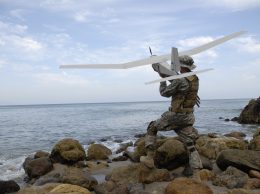Dubroff: Global upheaval may signal rebound for tri-county defense firms
IN THIS ARTICLE
- Columns Topic
- Henry Dubroff Author
By Henry Dubroff Friday, November 14th, 2014
Just a few years ago, the United States completed the withdrawal of troops from Iraq and the defense industry went into a downward gear shift.
With budget deficits looming and war tensions receding, it looked like the military-industrial complex was going to have to get used to a lower profile.
But since the 2011 pull-back, the picture has changed dramatically.
U.S. troops are back in Iraq, the Arab Spring has become a nightmare and the return to a Cold War confrontation with Russia in Europe looks like an extended affair — even as we celebrate the 25th anniversary of the fall of the Berlin Wall.
The Reagan Library & Presidential Museum is bringing a number of top military types, including Defense Secretary Chuck Hagel, to Simi Valley on Nov. 16 to discuss the sometimes murky global military situation.
But for the regional economy, the situation is pretty clear. Defense is likely to be back in a big way and that means an unexpected window of opportunity for military bases and military-oriented technology.
The Central Coast’s role in defense research and development is sometimes lost in the shadow of larger operations. But the Raytheon facilities in Goleta and Lompoc and Teledyne Technologies operations in the region are important centers for design and production of advanced sensors used in space defense, night vision and other places where the U.S. still has a big competitive advantage.
Drones built in Simi Valley are part of the new generation of kit the military uses in counterinsurgency and surveillance work.
Naval Base Ventura County and Vandenberg Air Force Base near Lompoc are two of the largest employers in the region, and they are likely to find enhanced and not reduced missions as the U.S. pivots to Asia, in part to meet the challenge of a rising China.
This is a big change for both the industrial and military complexes in our area. Teledyne, based in Thousand Oaks, has embarked on a diversification strategy that has made it a leader in underwater leak detection from deep water oil and gas wells.
Naval Base Ventura County has adapted several new missions including an asymmetric threat detection center that has been focused on threats to the homeland. Vandenberg has a port for launching Space X commercial vehicles into space.
But a bellicose Russia under Vladimir Putin and a “frenemy” competition with China will likely increase spending on advanced weapons, cybersecurity and threat detection. The Nov. 12 climate change and technology accords with China were big wins for U.S. diplomacy but the Reagan dictum of “trust but verify” will remain operative.
It turns out that surveillance, threat detection and cybersecurity are particular specialties of the niche defense companies operating on the Central Coast.
Where will the money come from? So far this year, the federal government is raking in 9 percent more revenue than last year and, thanks in part to low interest rates, spending is pretty much flat.
The federal budget deficit is a manageable 2.8 percent of GDP and one of the few line items in the budget that has risen this year is spending on defense.
Finally there is this. If there is to be any sort of thaw at all between the Congress and the Pentagon, the need for a stronger national defense will likely be an easy place to find common ground.
Over the decades, it’s been hard for the Tri-Counties to escape the boom-bust cycles of military spending. Fasten your seat belts.
• Reach Editor Dubroff at [email protected].
Related Articles
 Tuesday, June 28th, 2022
Tuesday, June 28th, 2022










